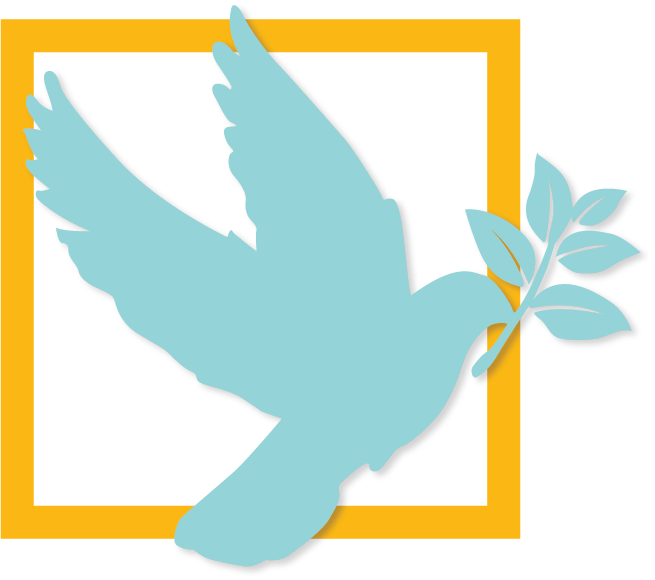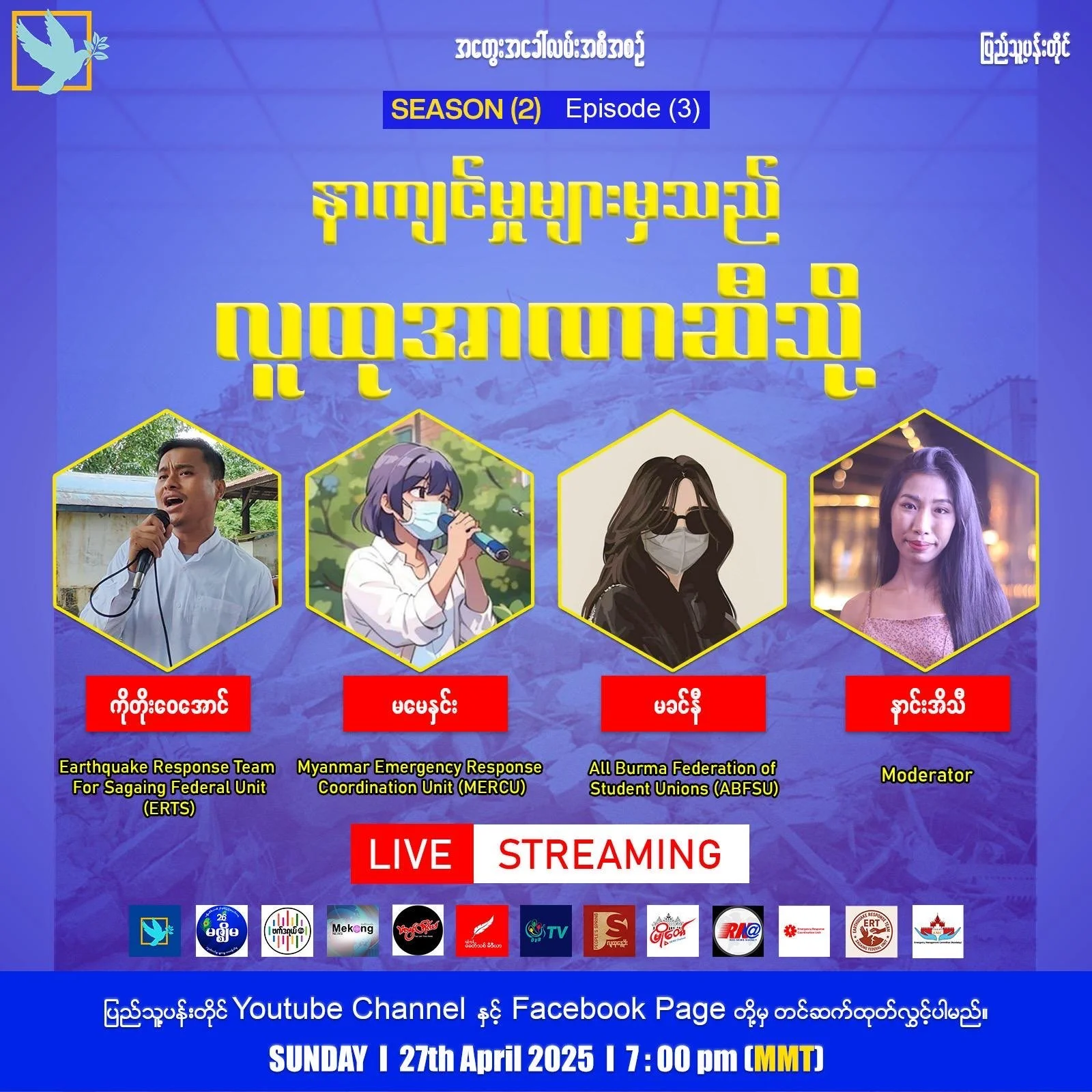Turning pains into people power
Speakers - Toe Wai Aung (Earthquake Response Team for Sagaing Federal Unit, ERTS), May Hnin (Myanmar Emergency Response Coordination Unit (MERCU), Khin Ni (All Burma Federation of Student Unions, ABFSU)
Moderator - Nang Ei Thi
Thought Process Program Season (2)/Episode (3)
Q: Moderator
How are earthquake rescue and response efforts going? What is the situation of local communities on the ground?
A: May Hnin
When we talk about earthquake response, there are three parts. The first part is the immediate emergency rescue effort. We needed to rescue people within 72 hours for higher chance of survival but there were obstructions, disruptions and oppression from the military council. Civil society organizations and humanitarian groups could not carry out rescue operations properly. So, we had to operate under a lot of restrictions. MERCU couldn’t provide effective support in this aspect but we help them make connection to receive some financial and material supports.
The situation with local communities is that, as we all know, the military never show any sign of humanity, sympathy and compassion. So, we believe all the financial and material assistances provided to affected community including rescue operations came mostly from other civilians. Very little came from the military council. I think up to 90-95 % were people-to-people support. So, it was about community resilience and people helping each other overcome this disaster.
Q: Moderator
What is ABFSU doing for earthquake response? What are the challenges that communities are facing on the ground?
A: Khin Ni
As soon as earthquake hit the country, people started helping each other very actively. We did the same. Some people were suggesting that people have lost passion, but community earthquake response efforts proved otherwise. People are not hesitant to get involve when it’s needed. People continue to help and support each other. Revolutionary forces also help the people and provide services to them. People always have to rely on themselves whenever the country run into trouble or face a natural disaster. It has been this way for over 70 years.
These are actually the responsibilities of the government, but currently in Myanmar under a military dictatorship that only care about exploiting and oppressing the people, the people only have themselves to rely on.
Q: Moderator
Ko Toe Wai Aung. What are some of the earthquake response activities that you implemented and what is the situation of local communities now?
A: Toe Wai Aung
We collected donations both from abroad and within the country and distributed materials to affected communities such as water purifier. In some cases, we gave cash for rebuilding classrooms that were damaged by the earthquake as a recovery effort. For security reason, I cannot discuss about some of the derail. ERDS members are working on the ground to distribute aids. We also provide emergency supports such as rations and other materials.
We have also made some preparation for long term, but like I mentioned we cannot discuss about these in detail. We could face obstruction from the military council. As for local communities, they were already in a multi-crisis situation, and this earthquake added another layer of suffering for them. To make the matter worse, the military council try to obstruct distribution of humanitarian aids. They even arrest some humanitarian workers. This has been a significant challenge for us in earthquake response. We struggle to provide swift responses and ensure timely delivery of aids.
Q: Moderator
The military council have used this period of earthquake and the suffering of the people to its advantage to receive humanitarian aids and regain legitimacy from the international community. They have also used this opportunity to launch both ground and air attacks. How do you think we should response to that?
A: May Hnin
Obviously, they were losing the fight in every front including in international platforms. The earthquake was a good opportunity for them to make official engagements with the international community. International community including international humanitarian organizations need to be clear about who they are trying to help – are they trying to help the affected communities or the military council.
I spoke with community members myself and they said to me that most of the helps and supports are come from people-to-people initiatives. As for the military council, if you look at what they have done during the first two weeks after the earthquake, you can see if they really even view this as a natural disaster and a humanitarian situation or not. You can see clearly if they put the people or their benefit first. This is what they do and it doesn’t surprise us. They have always prioritized their own benefit. So, when the international humanitarian organizations give aids to the military council, we need to ask them what their intention and interests really are. I can give you an example of what happened in Mandalay Region. Some of the liberated areas in Singu, Madaya, Thabeykkyin townships within Mandalay Region were among the most severely hit areas. There were large ground fissure, deaths and disappearance. About 50 people die during earthquake in those areas. The truth is that the military council continued its arial bombardment every day in those townships. They did if before the earthquake and they did it after the earthquake. They bombed those areas even a few days ago.
So, clearly, the SAC have no humanity. They don’t care about the people. They only care about defeating the resistance movement. They bombed those areas and blocked aids going into those areas. So, the question is why does the international community expect such institution to help the people and ask them to distribute aids?
Q: Moderator
ABFSU is always stay with the people when they are in trouble. Why do you think it’s important to face the crisis together with them. Some people also say rescuing people is the job of rescue/humanitarian groups and that political actors should stick to polities. Otherwise, people will become more dependent. What is ABFSU policy on this? Also do you think people will lose focus on the revolution because of the earthquake?
A: Khin Ni
It is essential that all the revolutionary actors work to provide necessary services to the public. Providing services to the people is more than mobilizing public support. Whether it is a crisis caused by Covid, flooding, earthquake, inflation or Cyclone Nargis, ABFSU always choose to stay with the people through thick and thin and fight alongside them in the most difficult times. This is why we work to serve the people. Revolutionary forces are founded on the support of the people. We can only operate and continue our works when the people maintain a fighting spirit and support us. It is the people themselves that have kept ABFSU and the revolution alive and going.
This is why we have to work to serve the people. We must serve the people. Also, we are part of the community as well. So, when the earthquake hit the country, the community rely on themselves to help and support each other. This is a very strong force. It is not just the revolutionary organizations but the community themselves that were affected by the earthquake were helping others. As a revolutionary organization, we have to share their suffering. This is how we win the genuine trust and respect of the people. Making the efforts to serve the people is another form of revolution. There is no way our focus on the revolution would be weaken because of the earthquake.
Q: Moderator
People are facing many crises at the same time including war and hunger, and on top of that, they were devastated by the earthquake. So, how do the revolutionary forces plan to minimize causing harm to the people in the future?
A: Toe Wai Aung
All the revolutionary forces including armed revolutionaries rely on the helps and supports of the people to advance the revolutionary movement. That means, the more people have to bear the costs of our actions, the more they will struggle to support the revolutionary forces. This is the reality. Those townships within Sigaing City as well as Wetlet and Shwebo townships were severely hit by the earthquake. There were damages in other townships as well. Townships within Sagaing City areas were under the control of the SAC. Other townships within Sagaing Region are controlled by the revolutionary forces. Some of the people who have been supporting the revolutionary forces were among the affected people living in the city. When they lost so much during the earthquake, their supports have declined significantly. Then, the revolutionary actors have had to shift their focus from fighting the SAC to helping the affected communities. I think this is where the question comes about where we should focus on. But helping the earthquake affected communities is also part of the politics and the revolution. The whole purpose of the revolution is to help the people and to rebuild a better society.
This earthquake is a problem, a crisis and a concern of the people. Helping them address these crises is a political move and a revolution. So, the political and armed revolutionary forces have been helping the earthquake victims, and as a result they might have been forced to postpone some of their other plans in the fight against the SAC. But it’s like an opportunity in a crisis. It’s a win for the revolution that we have managed to help and engage with the people at every opportunity during the earthquake.
Q: Moderator
We have floodings every year. We are also sitting right on top of a geological fault line which means these natural disasters are technically part of our lives. What should the people do to prepare for future disasters?
A: May Hnin
We can only anticipate natural disasters. We cannot predict them accurately. We cannot calculate or predict with certainty about earthquake or flood or wildfire. But what is certain is that there are proper response approaches and methods to response to natural disasters. In a normal time, say in a time under a good civilian government, there would be proper preparations in place such as drills for disaster response, stockpiles of disaster relief and equipment, proper response policies, plans and approaches, awareness campaigns etc. We would be able to respond effectively and efficiently. But right now, we don’t have a government that can manage earthquake responses properly. So, we have to rely on ourselves and do the best within our capacity to protect the people. Floodings and fires are a regular occurrence. We have to be alert about what is happening all the time.
It is very important for the people to have access to information about accurate whether forecasts and alerts. Information flow is very important. Each and every member the affected communities during the last earthquake would have experienced psychological trauma. And this is the same for the community who have suffered from ongoing war as well. So, people don’t need to be embarrassed about asking for counselling and psychological supports. We have to get through these situations together. So, if people can get psychological support, they should take it. We only have ourselves to rely on to endure these hardships and get through these situations together.
Q: Moderator
People are getting exhausted. We are starting to hear people talking more and more about resolving the situation through ceasefire and dialogues. What do you think political actors should do now?
A: Khin Ni
Returning to the path of reconciliation is very dangerous. This is not the first time we reach this point. Previous military dictators also used natural disaster to their advantage. The nearest example would be 2020 Covid period. Back then, they introduced new laws and rules which they use to suppress dissent voices. They used these laws and restrictions on public gathering to arrest people in Rakhine State who staged demonstration and called for an end to war in Rakhine State at that time. Now, soon after the earthquake, you see they try to put us on the path of reconciliation. International community too jumped in and try to pressure us for ceasefire. They would come up with these fancy commentaries, analysis and conclusions about how the revolution is harming the people. All these talks about reconciliation echo the narrative of the SAC and serve the same purpose which is to pressure the revolution to come to a halt. These discourses are shallow since they can’t really prove they represent the voice and desire of the people.
Today, people know well about the true colour of the military and the SAC. Following the earthquake, revolutionary forces announced a two-week ceasefire period in consideration for earthquake response, but the military continued to launch airstrikes and artillery attacks. They do this everywhere in the country even during Thingyan Festival causing so much destruction. People know well that negotiation with them won’t work. The people have suffered from so much loss and they are in so much pain. So, right now, the revolution forces need to put more efforts. They need to work harder to serve the people and help them recover. They need to help the people turn these fear and pain into a revolutionary spirit. We need to encourage them and empower them. We need to resist and reject internal and external actors who are trying to instill the idea of reconciliation. How do we do that? When the international community try to intervene in the revolution, we need to be very smart and cautious about our response to them. Then, we need to build strong alliance among us so that we have consistent policies and strong coordination among the revolutionary forces and become more influential as a collective force in our response to the international community. So, we need to build a strong coalition and make a smart and united response.
Q: Moderator
What is the view of the people on the revolution? Do you think their view can change over time? What about the NUG? They said 2025 would be the year of victory. Do you think it’s possible?
A: Toe Wai Aung
The earthquake caused a lot of problems and make the situation complicated. Bu here in the Dry Zone, I don’t see people talking about public perception on the revolution turning negative. Had the SAC taken a different approach in earthquake response and treat the people and help them properly even if it was just to win the support of the international community, the story would have been different. But in the Dry Zone, I think the revolutionary forces are not going to buy into that and reduce the tempo of the revolution.
NUG said that we have to try to make 2025 the year of victory. All I can say is that, as a citizen, I can assure that we will never back down. We will fight until we win. The UNG just need to make sure that they initiate necessary reform processes swiftly and bravely instead of just making cosmetic changes. As the revolution drag on, the ability and vision of the leadership becomes an extremely important factor. The people always keep their hope alive and give support to the leadership. This is not just my opinion. I talked to the people and this is what they said to me. When the earthquake hit, it caused a lot of destruction, but we also get to see yet again the true colour of the SAC. They were never sincere about helping the people and you can see during earthquake response that they don’t have good intention and they don’t value the lives of the people. They continue to carry out arial bombings even in those areas that were most severely affected by the earthquake. You can see it all over the news how civilians, monks and children are being killed by airstrikes.
They announced ceasefire but they won’t stop airstrikes, not even for a day. People continue to suffer from these airstrikes. Their actions only strengthen the dedication of the people to dismantle and put an end to military dictatorship and establish a good civilian government and a new society through a revolution. A revolution that will also bring about ideological changes.
Even if people were unsure about curtained things in the past, their commitment now has only become stronger over time. People continue to prioritize the revolution and help each other along the way. The revolution forces also need to talk to the people and consult with them. If we continue to do that, I don’t see how the public perception on the revolution can turn negative. In fact, we can even hope to mobilize more people to try to make 2025 a year of victory.


